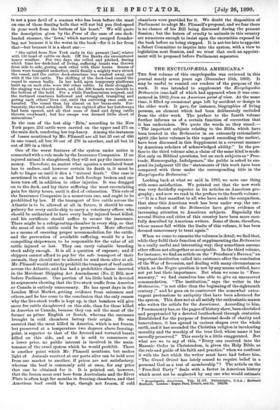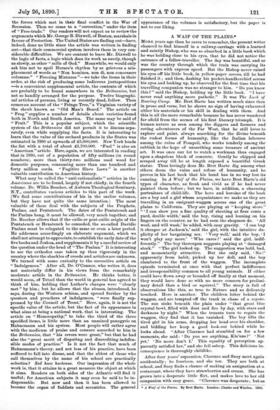THE ENCYCLOPIEDIA AMERICANA.* THE first volume of this encyclopEedia was
reviewed in this journal nearly seven years ago (December 15th, 1883). It may be useful to remind our readers of the purpose of the work. It was intended to supplement the Encyclopwdia Britannica (one-half of which had appeared when it was com- menced in 1882) from an American point of view. At the same time, it filled up occasional gaps left by accident or design in the older work. It gave, for instance, biographies of living persons, an element which had been deliberately excluded from the older work. The preface to the fourth volume further informs us of a certain function of correction that it has undertaken. We quote the words as they stand :— " The important subjects relating to the Bible, which have been treated in the Britannica in an extremely rationalistic spirit (the later volumes in this regard exceeding the earlier), have been discussed in this Supplement in a reverent manner by American scholars of acknowledged ability." In the pre- face to the third volume also, a claim of the same kind is made. Not only on Biblical questions, but on such subjects as " Free- trade, Homoeopathy, Indulgences," the public is asked to sus- pend its judgment till the " statements of this work have been compared with those under the corresponding title in the Encyclopedia Britannica."
Looking back at what we said in 1883, we note one thing with some satisfaction. We pointed out that the new work was very decidedly superior in its articles on American geo- graphy; and now we read in the preface to the fourth volume : —" It is a fact manifest to all who have made the comparison, that since this American work has been under way, the suc- cessive volumes of the Britannica have given evidence of increasing attention to American subjects. Especially the several States and cities of this country have been more care- fully described by American writers. Some of these, therefore, whose names fall within the limits of this volume, it has been deemed unnecessary to treat again."
When we come to examine the volumes in detail, we find that, while they fulfil their function of supplementing the Britannica in a really useful and interesting way, they sometimes assume other offices not altogether so acceptable. In the third volume, for instance, we find an article on the " Freedmen's Bureau," an important institution called into existence after the conclusion of the War of Secession, and dealing with many circumstances which, as the Negro question is not by any means settled, have not yet lost their importance. But when we come to " Free- masonry," we find ourselves less able to give an unreserved commendation. " The institution," says the writer in the Britannica, " is not older than the beginning of the eighteenth century ;" and he goes on to controvert the somewhat extra- vagant pretensions to antiquity that have been advanced for the system. This does not at all satisfy the enthusiastic mason who writes the article for the Americana. According to him, " Freemasonry has, as the pages of history show, been cherished and perpetuated by a devoted brotherhood through centuries. Established for the purpose of fraternal deeds of charity and benevolence, it has spread in various shapes over the whole earth, and it has seconded the Christian religion in inculcating morality and the worship of the true God, whose name it has sacredly preserved." This surely is a little exaggerated. Bat what are we to say of this, " Every one received into the Masonic Order in Christendom, is given the Holy Bible, as the rule and guide of his faith and practice," when we confront it with the fact which the writer must have had before him, " The Grand Orient has lately ceased to require belief in a personal God as a test of membership " ? The article on the " Free-Soil Party " deals with a factor in American history which must not be neglected by any one who would estimate • Encyclopedia Americana. Vole. II -IV. Philadelphia, U.S.A. : Hubbard Brothers. London : Kegan Paul, Trench, and Co. 1882-89. the forces which met in their final conflict in the War of Secession. Then we come to a "correction," under the item of " Free-trade." Our readers will not expect us to review the arguments which Mr. George B. Dixwell, of Boston, marshals in favour of Protection. The United States are finding out—have, indeed, done no little since the article was written in finding out—that their commercial system involves them in very con- siderable difficulties. We are content to leave Mr. Dixwell to the logic of facts, a logic which does its work as surely, though as slowly, as other " mills of God." Meanwhile, we would only ask him not to spoil Horace's rhythm by so grievous a mis- placement of words as " Non homines, non di, non concessere columnar." " Freezing Mixtures "—we take the items in their order, at the risk of producing some ludicrous juxtapositions —is a convenient supplemental article, the contents of which are probably to be found somewhere in the Britannica, but not so handily arranged for the purpose. Twelve biographi- cal articles of persons, living or recently dead, follow. Then comes an account of the " Fringe Tree," a Virginian variety of the shrub known as " Old Man's Beard." The article on " Frog " supplies a number of details about varieties found both in North and South America. The same may be said of " Fruit." This is a popular subject, which the scientific system of the Britannica did not permit it to discuss sepa- rately, even while supplying the facts. It is interesting to learn that the value of the orchard products in the States was estimated in 1880 at upwards of 25,000,000. New York heads the list with a total of about £1,700,000. "Fuel" is also an " American " article. Here, again, we are interested in reading that in 1880, out of a population of fifty millions (in round numbers), more than thirty-two millions used wood for domestic purposes, consuming more than one hundred and forty million cords. " Fugitive Slave Laws " is another -valuable contribution to American history.
What may be called the " anti-rationalistic" articles in the Americana are to be found, largely if not chiefly, in the fourth -volume. Dr. Willis Beecher, of Auburn Theological Seminary, N.Y., contributes various articles to this part of the work. (We find some contributions of his in the earlier volumes, but they have not quite the same intention.) The most valuable of these deal with the subjects of the Prophets, Psalms, and Pentateuch. The dates of the Pentateuch and the Psalms bang, it must be allowed, very much together, and Dr. Beecher allows that if the exilic or post-exilic origin of the Pentateuch or Hexateuch be conceded, the so-called Davidio Psalms must be relegated to the same or even a later period. He addresses accordingly an elaborate argument, which we shall not attempt to appreciate, to establish the early date of the five books and Joshua, and supplements it by a careful review of the question under the head of " The Psalms." It is interesting to see the orthodox case taken up thus vigorously in the country where the shackles of creeds and articles are unknown. We turned with some curiosity to the corrective article on " Indulgences." After all, Dr. O'Connor, who writes it, does not materially differ in his views from the remarkably moderate article in the Britannica. He thinks better, it would seem, of Tetzel than the world in general has agreed to think of him, holding that Luther's charges were " clearly met " by him ; but he allows that the abuses, introduced, he says, during the Western schism, and spread further by the questors and preachers of indulgences, " were finally sup- pressed by the Council of Trent." Here, again, it is not the specific value of the article, but the fact of its appearance in what aims at being a national work, that is interesting. The article on " Homceopathy," to take the third of the three specified items, is little more than an unmixed panegyric on Hahnemann and his system. Most people will rather agree with the modicum of praise and censure accorded to him in the Britannica, that " his errors were great," but that he had also the "great merit of disputing and discrediting indefen- sible modes of practice." Is it not the fact that much of Hahn.emarm's theory, and not less of his practice, have been suffered to fall into disuse, and that the ablest of those who call themselves by the name of his school are practically eclectics P Bed haec hactenus. Our impression of the whole work is, that it attains in a great measure the object at which it aims. Readers on both sides of the Atlantic will find it useful; for American subjects it may even be said to be in- dispensable. But now and then it has been allowed to become the organ of faddists and eccentrics. The general appearance of the volumes is satisfactory, but the paper is not to our liking.



































 Previous page
Previous page